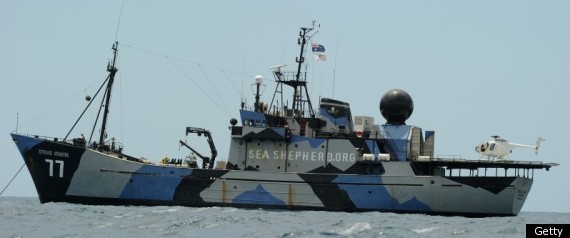 TOKYO (AP) -- Japan is spending 2.3 billion yen ($29 million) from its supplementary budget for tsunami reconstruction to fund the country's annual whaling hunt in the Antarctic Ocean, a fisheries official confirmed Thursday.
TOKYO (AP) -- Japan is spending 2.3 billion yen ($29 million) from its supplementary budget for tsunami reconstruction to fund the country's annual whaling hunt in the Antarctic Ocean, a fisheries official confirmed Thursday.Tatsuya Nakaoku, a Fisheries Agency official in charge of whaling, defended the move, saying the funding helps support Japan's whaling industry as a whole, including some whaling towns along the devastated northeastern coast. One ship on the hunt is based in Ishinomaki, a town hit badly by the March 11 tsunami, he said.
The budget request was made to beef up security and maintain the "stable operation" of Japan's research whaling, he said, which has faced increasingly aggressive interference from boats with the Sea Shepherd Conservation Society.
Conservationist group Greepeace blasted the funding move, claiming it was siphoning money away from disaster victims.
The Japanese government has passed supplementary budgets totalling 18 trillion yen ($230 billion) for reconstruction after the March 11 tsunami. Nearly all the items are rebuilding projects, including nearly 500 billion yen for fisheries projects directly in the region, but some, including the whaling expedition, appear less directly related.
Media reports said Japan's annual whaling expedition left Shimonoseki in southern Japan on Tuesday with plans to cull 900 whales, mostly minke whales, which are not endangered.
Japanese officials didn't confirm departure details, citing safety reasons. But Coast Guard spokesman Masahiro Ichijo said this year's fleet is carrying "the biggest protection ever," including an unspecified number of Coast Guard officers, safety equipment and a Fisheries Agency patrol ship.
He said the announcement of the deployment of coast guard officials "would serve as a deterrent" against attacks by the conservationist groups.
"We have no intention to show off our capability to respond to their attacks or declare a fight," Ichijo said.
Each year, protesters try to harass the whaling fleet into stopping the hunt Japan says is a scientific exemption from an international moratorium on commercial whaling.
The protesters say whale research does not require killing the animals, and Japan's scientific program amounts to commercial whaling in disguise because surplus meat is sold. Whale meat, however, is not widely eaten in Japan.
Clashes between the two sides often take place, and last January a Sea Shepherd boat was sunk after its bow was sheared off in a collision with a whaling ship. The hunting season runs from about December through February.
Origin
Source: Huff
No comments:
Post a Comment